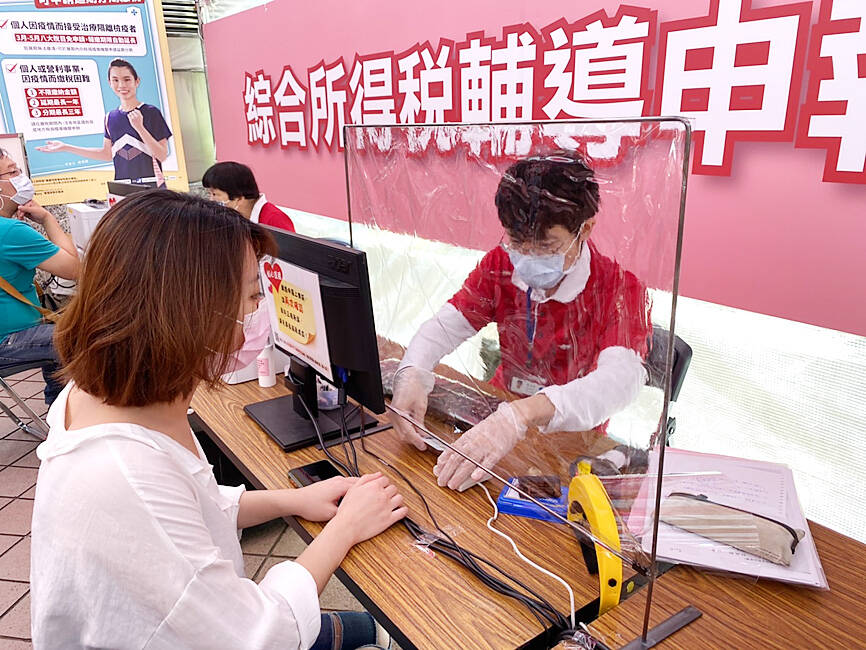The government last month collected NT$95.6 billion (US$3.1 billion) in tax revenue, up 24.6 percent from February last year, thanks to more working days that boosted personal income, securities transactions and vehicle sales taxes, the Ministry of Finance said yesterday.
However, the state coffers reported a 2.7 percent annual decline in tax revenue for the first two months of this year, as corporate income, the local bourse and the property market lost steam amid economic challenges, the ministry said.
Corporate income tax revenue dropped 13.8 percent year-on-year to NT$4.6 billion last month and declined 15.9 percent to NT$8.5 billion in the first two months, as exporters took a hit from a global economic slowdown, ministry statistics official Liang Kuan-shuan (梁冠璇) told an online media briefing.

Photo: Allen Wu, Taipei Times
Personal income tax revenue rose 10.7 percent year-on-year to NT$41.3 billion last month and 5.9 percent annually for the first two months to NT$80.4 billion, Liang said, attributing the trend to higher stock dividends.
Tech and non-tech firms reported robust business in the first half of last year before taking a hit amid global central banks’ interest increases to fight inflation, affecting demand for nonessential goods.
Securities tax revenue rose 11 percent year-on-year to NT$12.2 billion last month, which had three working days more than February last year, Liang said, adding that tax revenue in the first two months plunged 32.9 percent to NT$19.1 billion, weighed by lingering bleak sentiment.
The US Federal Reserve last month slowed the pace of rate increases, raising it by 0.25 percentage points, but this week indicated that more aggressive steps might be taken in the coming months, citing stronger-than-expected economic data.
The New Taiwan dollar has weakened against the US dollar, reversing an earlier rebound, as global funds again pulled out of Taiwan in search of higher yields in US dollar denominated assets, central bank data showed.
The tax revenue generated from land value gains last month fell 22 percent from a year earlier to NT$5.7 billion and plummeted 40 percent annually to NT$10.8 billion in the first two months, Liang said, citing as reasons interest rate hikes in Taiwan and new rules banning the resale of presale house purchase agreements.
The number of taxable cases in the local real-estate market in the first two months shrank 25.9 percent year-on-year to 79,182, as buyers stayed on the sidelines, Liang said.
Sales tax revenue bucked the downtrend with a 40.5 percent surge to NT$15.1 billion last month and increased 2.1 percent to NT$23.7 billion in the first two months, the ministry said.
The holiday effect and a noticeable advance in imported vehicles drove the strong showing, Liang said.
The cumulative tax revenue of NT$272.4 billion in the first two months was 5.2 higher than the government’s target, she said.

Taiwan Semiconductor Manufacturing Co (TSMC, 台積電) last week recorded an increase in the number of shareholders to the highest in almost eight months, despite its share price falling 3.38 percent from the previous week, Taiwan Stock Exchange data released on Saturday showed. As of Friday, TSMC had 1.88 million shareholders, the most since the week of April 25 and an increase of 31,870 from the previous week, the data showed. The number of shareholders jumped despite a drop of NT$50 (US$1.59), or 3.38 percent, in TSMC’s share price from a week earlier to NT$1,430, as investors took profits from their earlier gains

In a high-security Shenzhen laboratory, Chinese scientists have built what Washington has spent years trying to prevent: a prototype of a machine capable of producing the cutting-edge semiconductor chips that power artificial intelligence (AI), smartphones and weapons central to Western military dominance, Reuters has learned. Completed early this year and undergoing testing, the prototype fills nearly an entire factory floor. It was built by a team of former engineers from Dutch semiconductor giant ASML who reverse-engineered the company’s extreme ultraviolet lithography (EUV) machines, according to two people with knowledge of the project. EUV machines sit at the heart of a technological Cold

Taiwan’s long-term economic competitiveness will hinge not only on national champions like Taiwan Semiconductor Manufacturing Co. (TSMC, 台積電) but also on the widespread adoption of artificial intelligence (AI) and other emerging technologies, a US-based scholar has said. At a lecture in Taipei on Tuesday, Jeffrey Ding, assistant professor of political science at the George Washington University and author of "Technology and the Rise of Great Powers," argued that historical experience shows that general-purpose technologies (GPTs) — such as electricity, computers and now AI — shape long-term economic advantages through their diffusion across the broader economy. "What really matters is not who pioneers

TAIWAN VALUE CHAIN: Foxtron is to fully own Luxgen following the transaction and it plans to launch a new electric model, the Foxtron Bria, in Taiwan next year Yulon Motor Co (裕隆汽車) yesterday said that its board of directors approved the disposal of its electric vehicle (EV) unit, Luxgen Motor Co (納智捷汽車), to Foxtron Vehicle Technologies Co (鴻華先進) for NT$787.6 million (US$24.98 million). Foxtron, a half-half joint venture between Yulon affiliate Hua-Chuang Automobile Information Technical Center Co (華創車電) and Hon Hai Precision Industry Co (鴻海精密), expects to wrap up the deal in the first quarter of next year. Foxtron would fully own Luxgen following the transaction, including five car distributing companies, outlets and all employees. The deal is subject to the approval of the Fair Trade Commission, Foxtron said. “Foxtron will be